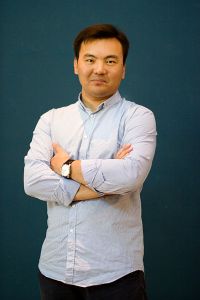In his “State of the Wiki” address at the 2011 Wikimania, Jimmy Wales awarded the first ever “Wikipedian of the Year” award to Rauan Kenzhekhanuly, a Wikipedian from Kazakhstan. Included with the honor was travel expenses to bring Rauan to Wikimania 2012 in Washington, D.C., next week, where Rauan is looking forward to sharing his experiences with growing the Kazakh Wikipedia and learning more about others’ outreach programs.

Rauan worked in civil service in Kazakhstan for several years before jumping at an opportunity to do a one-year fellowship at Harvard University in Boston. As part of his fellowship, he took a class in fall 2010 that changed his life: Professor Nicco Mele’s “Media, Politics, and Power in the Digital Age”, part of a pilot of the Wikipedia Education Program. Students in Professor Mele’s class were required to read Andrew Lih’s book “The Wikipedia Revolution: How a Bunch of Nobodies Created the World’s Greatest Encyclopedia” and contribute to the English Wikipedia. Rauan was hooked.
“Thanks to Nicco’s class I discovered the Wikipedia world. The influence was so profound that it brought me to a new path in my career,” he says. “While editing the article in English Wikipedia, I checked the Kazakh version as well. However, I was disappointed when I saw that Kazakh Wikipedia doesn’t have sustainable community.”
Rauan set out to change that. He recruited some friends and founded WikiBilim (bilim means “knowledge” in Kazakh), a nonprofit organization devoted to expand the availability of free knowledge on the internet in the Kazakh language. WikiBilim’s first target was the Kazakh Wikipedia, which at that point had just 7,000 articles and only 4 active editors. Rauan and his friends at WikiBilim set a target of 200,000 articles maintained by a sustainable community of 500 active editors.
“At the very beginning we were looking for messages powerful enough to engage more people in our project,” Rauan says. “We decided to change the well-known Wikipedia motto from ‘free access to sum of human knowledge’ to ‘free access to sum of human knowledge in your own language.’ The appeal to language worked out. Today we have more than 130,000 articles and more than 200 active editors.”
WikiBilim has had support from many organizations in Kazakhstan, including the printed Kazakh National Encyclopedia, which donated content to the Kazakh Wikipedia. Success of the project brought attention of Kazakh Government, in November 2011 Prime-Minister of Kazakhstan Mr. Karim Masimov announced his patronage to WikiBilim’s projects. WikiBilim has also received support from the Sovereign Wealth Fund Samruk-Kazyna and the Wikimedia Foundation in their efforts to improve the availability of information on the Kazakh Wikipedia. Rauan and the other WikiBilim volunteers have also presented their experiences to a number of other Wikimedians from the region at the Turkic Wikimedia Conference in Almaty in April 2012.
And just as Rauan got his start with Wikipedia in the classroom, WikiBilim is planning to encourage the Kazakh Wikipedia’s use in educational institutions in Kazakhstan. Four student clubs are getting started and 10 Wikipedia Ambassadors run campus-based trainings each week. Rauan sees students as a main consumer of the information they’re creating on the Kazakh Wikipedia, and he hopes to encourage them to join the community of editors and contribute to the 200,000 article goal WikiBilim set last year.
“The main thing of contributing to Wikipedia for me is that we can clearly highlight that each community will be responsible for their own language, education, and culture,” Rauan says. “At the end, Wikipedia will be most important educational project.”
LiAnna Davis, Wikipedia Education Program Communications Manager
Additional reporting by Aaron Muszalski

Can you help us translate this article?
In order for this article to reach as many people as possible we would like your help. Can you translate this article to get the message out?
Start translation